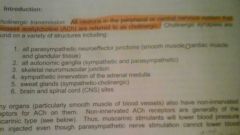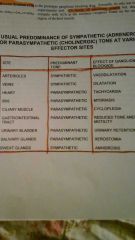![]()
![]()
![]()
Use LEFT and RIGHT arrow keys to navigate between flashcards;
Use UP and DOWN arrow keys to flip the card;
H to show hint;
A reads text to speech;
37 Cards in this Set
- Front
- Back
- 3rd side (hint)
|
CHOLINE ESTERS
|
Acetylcholine
Bethanechol |
cholinomimetic drugs (agents thatvdirectly enchance cholinergic function)
|
|
|
Natural occuring cholingeric stimulants (alkaliods)
|
Nitotine
Muscarine Pilocarpine |
|
|
|
Anticholinestarase agents: Reversible agents
|
Physostigmine
Edrophonium Pyridostigmine (mestinon) Donepezil |
agents that indirectly increase cholingeric function
|
|
|
anticholinesterase agents: irreversible agents
|
Parathion
|
|
|
|
Muscarinic Blocking Drugs
|
Atropine
Scopolamine Tropicamide Benztropine Oxybutynin |
|
|
|
Ganglionic Transmission: Stimulants
|
Nicotine
|
|
|
|
Ganglionic Blockade
|
Hexamethonium
|
|
|
|
Cholingeric Transmission
|
All neurons in the peripheral or central nervous system that releases acetylcholine (ACh) are referred to as cholingeric
|
|
|
|
Cholingeric Synapses
|

|
|
|
|
Hemicholinium (HC-3)
|
blocks the transport of choline and consequently will eventually cause an inhibition of cholingeric function
|
|
|
|
Botulinium toxin
|
prevents the release of ACh from nerve terminal. leads to death
|
|
|
|
Latrotoxin (blavk widow venom)
|
cause excessive fusing of the granules with the nerve membrane that leads to excessive release and eventual depletion of the transmitter
|
|
|
|
Muscarinic
|
Heart ---- decreases heart rate decrease conduction
Vascular Smooth Muscle --- no effect Eye ---- myosis (closing of pupil) and cyclotonia (spasm of accommodation) GI tract --- increase tone and motility, relaxes lower esophagus sphincter Bronchiolar Smooth Muscle ---- relaxation Secretory Glands --- causes sweat CNS |
|
|
|
Nicotinic Receptors
|
NMJ
Automonic ganglia Adrenal medulla- release of ephinephrine and norepinephrine CNS |
|
|
|
Acetylcholine
|
must be injected (intravenously)
not used as a therapeutic agent (increasr mobility) |
|
|
|
Methacholine
|
long duration of action --- used for asthma
|
|
|
|
Bethanechol
|
well established clinical ultlity
treating postoperative urinary retention anf atony of the GI tract (enzyme breakdown) |
|
|
|
Nicotine
|
stimulates all nicotinic receptors
activate all autonomic ganglia and stimulates the skeletal muscles endplate |
|
|
|
Muscarine
|
mushroom poisoning
atropine as antidote stimulate all muscarinic receptors whethrt innervated or noninnervated |
|
|
|
Pilocarpine
|
south America shrub
readily crossee membrane barriers treats glaucoma!!!! |
|
|
|
Anticholinesterase agents
|
indirectly enchance cholingeric function
ACh can remain on synapse longer period effective as antidotes to curare |
|
|
|
ACHASE inhibitors (anticholinestarase)
|
reversible
treatment of myasthenia gravis and glaucoma |
|
|
|
Physostigmine
|
treatment of atropime posioning and atropine poisoning
|
|
|
|
Reversible Agents
|
Physostigmine
Pyridostigmine Edrophonium Donepezil Parathon |
|
|
|
Pyridostigmine
|
treat myasthenia gravis
long-term process -- patient tolerance or allergies may occur |
|
|
|
Edrophonium
|
short duration of action
inhibits ACHASE only for minutes and thus is valuable for the diagnosis of M.G. May experience skeletal weakness |
|
|
|
Donepezil
|
treat cognitive dysfunction seen in patients with Alzheimer's disease
|
|
|
|
Parathion
|
irreverisble agent
common insecticides |
|
|
|
Muscarinic Blocking Drugs
|
lack of motility and secretiond of all parasympathetic innervated organs
alterations of heart rate, mydriasis, and cycloplegia as well as CNS effects |
|
|
|
Atropine
|
oral adminstration
poison to children hot dry skin, dilated pupils and maniacal behavior (RED AS A BEET...HOT AS A PISTOL...DRY AS A BONE...MAD AS A HATTER) |
|
|
|
Scopolamine
|
topical administration
prevent motion sickness |
|
|
|
Tropicamide
|
used for genersl opthalmological exams for the short duration muscarinic antagonist
|
|
|
|
Ipratropium
|
applied typically to the airway by means of metered inhaler
COPD --- bronchodilation bronical asthma best if combined with other bronchodilators |
|
|
|
Benztropine
|
Antimuscarinic drug
Relieve symptoms of Parkinson disease |
|
|
|
Oxybutynin
|
treat spasms of the bladder seen after urologic surgery and in some neurological disorders producing bladder hyperactivity
|
|
|
|
Ganglionic transmissionv-- Hexamethonium
|
experimental tool
blocks all autonomic gangliavbut compete with ACh at the nicotinic receptors found in endplate region of skeletal muscle |
|
|
|
USUAL PREDOMINANCE OF SYMPATHETIC (adrenergic) OR PARASYMPATHETIC (cholinergic) TONE OF VARIOUS EFFECTOR SITES
|

|
|

